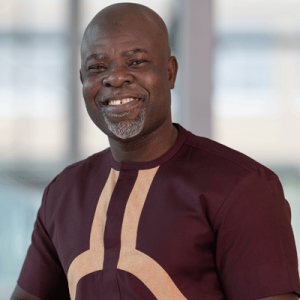Overview
Understand the concepts and issues of anti-racism with nine flexible online modules in 10-weeks
Gain a greater understanding of concepts such as race, racism, anti-Black racism and how they can unconsciously manifest in general and organizational relations.
- Recognize the ways that White supremacy and implicit bias have shaped social behaviours, society, and our institutions
- Understand and apply this knowledge in everyday social relations
- Apply these learnings to make changes to systemic barriers
Information Box Group

Program highlights Learn More
- Earn a certificate of attendance
- Flexible online courses – nine modules
- Developed in collaboration with the Department of Psychiatry and Behavioural Neurosciences, McMaster University’s Faculty of Health Sciences and designed by Paul Banahene Adjei and Bev Pindar-Donick
- Open enrolment program
Anti-Black Racism and Critical Race Education features:
- Earn a certificate in 10-weeks when you complete modules one to eight.
- Three virtual tutorials for further module discussion and participant collaboration
- Learn at your own pace with convenient online modules that use real-world examples
- Claim a maximum of 8 MOC Section 3 Self-Assessment hours, approved by the Royal College of Physicians and Surgeons of Canada

What you'll learn Learn More
- Historical, sociological and ideological dynamics that produce and sustain issues of race, racism and whiteness
- Terminology, concepts and issues of anti-racism
- How to reflect, understand and apply this knowledge to everyday social relations
Through our course Anti-Black Racism and Critical Race Education you’ll learn to:
- Recognize the ways that White supremacy and implicit bias have shaped social behaviours, society and our institutions
- Question and reflect on one’s beliefs, values and environment
- Confront one’s own privilege and complicity and take individual and collective actions to counteract systemic racism
- Foster ally-ships with racialized persons and communities
- Enable learners, in positions of privilege, to have more compassion towards others of various backgrounds, ethnicities and experiences
- Use the information learned to be transparent and accountable of your own unconscious biases
- Empower leaders and those in positions of power to use their influence to educate others and make the much-needed changes to systemic barriers
- Find new ways of having hard conversations
Learn more about the course
 Dr. Paul Banahene Adjei is an Associate Professor and the Interim Associate Vice-President (Indigenous Research) at Memorial University of Newfoundland. He was previously the Interim Dean of the School of Social Work, Memorial University.
Dr. Paul Banahene Adjei is an Associate Professor and the Interim Associate Vice-President (Indigenous Research) at Memorial University of Newfoundland. He was previously the Interim Dean of the School of Social Work, Memorial University.
Dr. Adjei received his undergraduate degree in Social Work from the University of Ghana, and his Master and PhD degrees from the University of Toronto specializing in Social Justice Education.
An Award-winning scholar, a skillful academic and a respected researcher and a public speaker, Dr. Adjei’s expertise is in the areas of equity, diversity, inclusion, indigenization, and anti-Black racism education. He has presented over 70 papers at national and international conferences; featured on several newspapers, radio and television programs and has organized several trainings for federal and provincial government employees on issues around equity, diversity, inclusion and anti-racism.
An active researcher, Dr. Adjei has secured several findings for his work from the Social Sciences and Humanities Research Council and has published over 30-refereed essays in scholarly journals and book chapters and co-edited a publication. Dr. Adjei is a passionate, a compassionate, and a critical thinking educator, who teaches students to not only think outside the box but also to disrupt the box. He has supervised and mentored several students to the completion of Bachelor, Master, and PhD degrees.
A committed community builder, Dr. Adjei serves on several committees such as the Newfoundland and Labrador English School District Provincial Anti-Racism Advisory Committee, the Newfoundland, and Labrador RCMP Black Engagement Steering Committee. He also serves as the Director of the Ghanaian Community of Newfoundland and Labrador Association, and a member of the Board of Directors of Ghana Union of Canada. He was a member of Health Accord NL Task Force Education Working Group.
In 2022, he was honoured as one of the Most Inspiring Immigrants in Atlantic Canada.
- Anyone with a professional or academic background interested in developing an understanding of anti-racism education and making a difference
This course (activity) is an Accredited Self-Assessment Program (Section 3) as defined by the Maintenance of Certification Program of the Royal College of Physicians and Surgeons of Canada and approved by McMaster University Continuing Professional Development Program. You may claim a maximum of 8 MOC Section 3 Self-Assessment hours (credits are automatically calculated).
“Systemic racism is a machine that runs whether we pull the levers or not, and by just letting it be, we are responsible for what it produces. We have to actually dismantle the machine if we want to make a change.”
– Ijeoma Oluo; So You Want to Talk About Race
Check out our latest Online Info Session recording to learn more about Anti-Black Racism and Critical Race Education
What our recent participants are saying
Kelly Edge
Anti-Black Racism and Critical Race Education Training Participant
Mary Wilson
Anti-Black Racism and Critical Race Education Training Participant
The course was well laid out, very informative, and I believe it has better prepared me to be more open about race issues and conservations.
George Hamilton
Anti-Black Racism and Critical Race Education Training Participant
The amount of information in the course was phenomenal, and the amount of learning that happened with it was great as well.
Kelly Goodale
Anti-Black Racism and Critical Race Education Training Participant
Sangita Singh
Anti-Black Racism and Critical Race Education Training Participant
Nicole Kucharuk
Anti-Black Racism and Critical Race Education Training Participant
Amy Pachai
Anti-Black Racism and Critical Race Education Training Participant
This course gives you the ability to have open conversations with a diverse group of learners who can share their personal experiences with the amazing guidance, knowledge, and direction from Dr. Adje
I really enjoyed taking the Anti-Black Racism and Critical Race Education course with instructor, Dr. Paul Adjei.
It is crucial to know more about black history in Canada so we can begin to understand why we are where we are today. This course provided that in a well-structured manner.
This course gives you the ability to have open conversations with a diverse group of learners who can share their personal experiences with the amazing guidance, knowledge, and direction from Dr. Adjei.
I know it can be difficult to know how to approach some of these difficult and sometimes uncomfortable yet much needed conversations/topics and at the same time feel that you have achieved some movement forward. I feel that Dr. Adjei has truly nailed the approach. He provides great examples, stories, and insight as an expert in his field. He is open to answering questions and everyone was eager to listen to his responses, which fostered so much learning and a better understanding of various perspectives.
This course is beneficial to everyone who is looking to build a cohesive and culturally safe environment for diverse teams and wants to be a part of the change that is needed to move forward in an equitable way.
Thank you to all who made this course possible.
Kelly Edge
Anti-Black Racism and Critical Race Education Training Participant
This for me was by far one of the best courses that I have taken.
This for me was by far one of the best courses that I have taken. The content, the delivery, the videos, the discussion, the flow, and the authenticity of conversations were very helpful for me to get an in-depth understanding of some of the things that I already knew from a historical perspective.
A lot of organizations would benefit from having this course as team training and implement in the structures organization.
As a Woman of Colour, this course has been a therapeutic relief by knowing, hearing, and understanding that we are not alone. It is a struggle that continues but there is hope from all of this while equipping us with the tools to educate others and engage in meaningful conversations to be part of the change.
Mary Wilson
Anti-Black Racism and Critical Race Education Training Participant
The course was well laid out, very informative, and I believe it has better prepared me to be more open about race issues and conservations.
George Hamilton
Anti-Black Racism and Critical Race Education Training Participant
The amount of information in the course was phenomenal, and the amount of learning that happened with it was great as well.
Kelly Goodale
Anti-Black Racism and Critical Race Education Training Participant
A lot of the learning is social and dialogic, where we exchange our ideas and get comfortable being in a shared space...
A lot of the learning is social and dialogic, where we exchange our ideas and get comfortable being in a shared space and talking about difficult things which is an opportunity to practice cross-racial dialogue.
Sangita Singh
Anti-Black Racism and Critical Race Education Training Participant
This course opened my eyes and equipped me with critical knowledge about racism, including its historical context, systemic structures, and biases.
This course opened my eyes and equipped me with critical knowledge about racism, including its historical context, systemic structures, and biases. This understanding empowers all of us to actively combat and dismantle racism. I would encourage each of us to examine our own biases and behaviors, and taking this course is a significant step towards that. I would highly recommend this course and feel it should be made mandatory.
Nicole Kucharuk
Anti-Black Racism and Critical Race Education Training Participant
This course provided both useful knowledge around anti-black racism and excellent examples to highlight the need for anti-racist perspectives in our society.
This course provided both useful knowledge around anti-black racism and excellent examples to highlight the need for anti-racist perspectives in our society. I feel much more well-rounded in my knowledge now, and enjoyed the learning experience overall.
Amy Pachai
Anti-Black Racism and Critical Race Education Training Participant
Other programs you may be interested in
Certificate in Anti-Black Racism and Critical Race Education
Certificate of Attendance in Anti-Black Racism and Critical Race Education
Earn your Certificate of Attendance in Anti-Black Racism and Critical Race Education
Explore the requirements below and register today!
Information Box Group

Certificate of Attendance
Earn a Certificate of Attendance in Anti-Black Racism and Critical Race Education by completing modules 1 to 8
Note: Module 9 is a bonus module and not required to earn the Certificate of Attendance
Course
Please note: Tuition price does not include HST
Learn more about the Anti-Black Racism and Critical Race Education Modules
Click on each module below for a general description of topics that will be covered. To earn a certificate of attendance, you must complete modules 1 to 8.
Note: Module 9 is a bonus module that is not required to be completed to earn the certificate of attendance.
This module begins with the introduction of some key concepts and terms. The primary goal is to broaden participants’ knowledge and understanding of these key concepts and terms often used in anti-racism education. The discussions will draw on examples from local, national, and global contexts to bring conceptual clarity to these terms.
The following are some of the concepts that will be discussed in Module 1: Race, Racialization, Racism, Types of Racism, Anti-Black Racism, Intersectionality, Color Blindness, Meritocracy.
Module 2 continues the discussion on some of the key concepts and terms often used in everyday conversations and in anti-racism education. The primary goal is to broaden participants’ knowledge and understanding of these concepts.
The module will integrate research from social science disciplines with more traditional and critical sociological paradigms February 2023 to engage such questions as: what is ‘Whiteness,’ ‘White Privilege,’ ‘White Supremacy,’ ‘White Fragility,’ ‘Colonialism,’ ‘Indigenization’, and ‘Decolonization’.
This module traces Black peoples’ history in Canada predating the formation of Canada as a nation state. In doing so, it challenges three misconceptions about Canada regarding Black people’s history in Canada: (1) Canada never practiced slavery; (2) Canada stood against slavery by offering a safe haven for Black people escaping slavery in the United States; (3) Blacks started arriving in Canada after White Settlers had successfully built the country.
The module traces the history of anti-Black racism in laws, policies, politics, and practices in Canada dating back to the 1700s to the present day.
Critical Race Theory (CRT) is a relatively new form of legal scholarship emerging from the Civil Rights and Critical Legal Studies movements in the United States during the 1950s and 1960s. The theory emerged in the 1980s from a group of, predominantly racialized, civil rights activists and legal scholars including Derrick Bell, Kimberlé Crenshaw, Richard Delgado, and Patricia Williams. These Legal scholars felt the enthusiasm that greeted racial reforms in the United States during the Civil Rights Movements was gradually dissipating. They also noted that the old approaches of conducting protests and appealing to the moral sensibilities of American citizens were yielding fewer results. After the seminal Critical Legal Studies alternative conference on the silence of race, CRT as an activist movement exploded and scholars such as Richard Delgado, Kimberlé Crenshaw, Angela Harris, Charles Lawrence, Mari Matsuda, Patricia Williams, Neil Gotanda, Eric Yamamoto, Francisco Valdes, and Kelvin Johnson built on the earlier discussion of race and racism in jurisprudence. In Canada, CRT is finding expression in some of the work of Carol Aylward and locally based community legal groups like the African Canadian Legal Clinic in Toronto. However, it has not received the same amount of support or attention as CRT work in the US. Today, CRT has expanded to several facets of academic disciplines including the field of education.
In Module 4, we will explore in detail the CRT and its central tenets. We will explore the similarities and differences between CRT and Anti-Racism Education, as well as the importance of CRT praxis for educational transformation.
We know through cognitive science that human behaviours, beliefs, values, worldviews, and attitudes are formed and shaped by automatic and unconscious cognitive processes (Burgess, Fu & van Ryn, 2004). Even when that information is unreliable, inaccurate, and one-sided, it does not stop the mind to rely on the information it has collected consciously and unconsciously to make decisions and judgement calls about people and situations.
In Module 5, we discuss unconscious biases, their varied forms, how they get formed, the mechanisms that work against human ability to recognize them, and the most effective ways of dealing with unconscious biases in the workplace and institutional settings.
This module provides conceptual clarity of cultural competency, humility and sensitivity and its shifting nature. It will provide participants with the historical origin of cultural competency/humility and sensitivity and discuss the different stages of cultural competence. It will further discuss the limitations of cultural competency/humility/safety and sensitivity in critical whiteness studies and anti-racism education. What do you need to know about different cultural groups in order to work with them effectively.
Race is the proverbial White Elephant in a room. Everybody knows it is there, no one really wants to talk about it. Given the tensions, emotions, anxieties, and fears that come with conversations on race, we ignore race-based conversations even when legitimate issues are tabled for discussion.
In Module 7, we discuss attitudes and behaviours that can make cross-racial dialogue difficult and offer multiple strategies for organizations, management and institutions to facilitate critical discussions on race in workplace environments that have a diverse workforce. Questions that we will be discussing include what concerns you most about cross-racial dialogue? How do we position differences in ways that can make a difference? Do you need support in how your organization can engage in cross-racial dialogue in the workplace?
Module 8 will explore the psychiatry of racism, anti-Black racism and colonialism and their implications in the field of mental health. The discussion will draw on readings that speak to the historical and ongoing micro and macro aggressions against Black people in Canada and the United States. It will place significant emphasis on the language used in the field of psychiatry, mental health practices and counselling to deny the humanity of Black people while justifying their dehumanized treatments. The goal here is to unpack on how whiteness is situated within mental health practices and counselling emphasizing micro/clinical aggression against racialized people.
Although the scourge of racism and anti-Black racism has been evident in the field of mental health for many years, only recently that there has been an active interest to promote antiracist and decolonial approaches to correct historical damage done to the othered communities. I agree with Dr. Angela Davis that “in a racist society, it is not enough to be non-racist, we must be anti-racist.” Healthcare providers must actively work on every single level, towards being anti-racist.
This module explores the importance of culture and race in cross-racial therapeutic settings. The goal is to identify and discuss guidelines for anti-racist strategies in mental health care counselling as well as to discuss appropriate culturally and racially assessment tools for working with racialized and Indigenous clients. The section ends with discussion on treatment approaches that address the real needs and issues of racism experienced by Indigenous and racialized individuals.
Anti-Black Racism and Critical Race Education Course
Anti-Black Racism and Critical Race Education Course
Learn to educate others and make changes to systemic barriers
Explore the modules below.
The next offering will be in the Fall term: September 16 – November 22, 2024.
Course
Please note: Tuition price does not include HST
Learn more about the Anti-Black Racism and Critical Race Education Modules
Click on each module below for a general description of topics that will be covered. To earn a certificate of attendance, you must complete modules 1 to 8.
Note: Module 9 is a bonus module that is not required to be completed to earn thecertificate of attendance.
This module begins with the introduction of some key concepts and terms. The primary goal is to broaden participants’ knowledge and understanding of these key concepts and terms often used in anti-racism education. The discussions will draw on examples from local, national, and global contexts to bring conceptual clarity to these terms.
The following are some of the concepts that will be discussed in Module 1: Race, Racialization, Racism, Types of Racism, Anti-Black Racism, Intersectionality, Color Blindness, Meritocracy.
Module 2 continues the discussion on some of the key concepts and terms often used in everyday conversations and in anti-racism education. The primary goal is to broaden participants’ knowledge and understanding of these concepts.
The module will integrate research from social science disciplines with more traditional and critical sociological paradigms February 2023 to engage such questions as: what is ‘Whiteness,’ ‘White Privilege,’ ‘White Supremacy,’ ‘White Fragility,’ ‘Colonialism,’ ‘Indigenization’, and ‘Decolonization’.
This module traces Black peoples’ history in Canada predating the formation of Canada as a nation state. In doing so, it challenges three misconceptions about Canada regarding Black people’s history in Canada: (1) Canada never practiced slavery; (2) Canada stood against slavery by offering a safe haven for Black people escaping slavery in the United States; (3) Blacks started arriving in Canada after White Settlers had successfully built the country.
The module traces the history of anti-Black racism in laws, policies, politics, and practices in Canada dating back to the 1700s to the present day.
Critical Race Theory (CRT) is a relatively new form of legal scholarship emerging from the Civil Rights and Critical Legal Studies movements in the United States during the 1950s and 1960s. The theory emerged in the 1980s from a group of, predominantly racialized, civil rights activists and legal scholars including Derrick Bell, Kimberlé Crenshaw, Richard Delgado, and Patricia Williams. These Legal scholars felt the enthusiasm that greeted racial reforms in the United States during the Civil Rights Movements was gradually dissipating. They also noted that the old approaches of conducting protests and appealing to the moral sensibilities of American citizens were yielding fewer results. After the seminal Critical Legal Studies alternative conference on the silence of race, CRT as an activist movement exploded and scholars such as Richard Delgado, Kimberlé Crenshaw, Angela Harris, Charles Lawrence, Mari Matsuda, Patricia Williams, Neil Gotanda, Eric Yamamoto, Francisco Valdes, and Kelvin Johnson built on the earlier discussion of race and racism in jurisprudence. In Canada, CRT is finding expression in some of the work of Carol Aylward and locally based community legal groups like the African Canadian Legal Clinic in Toronto. However, it has not received the same amount of support or attention as CRT work in the US. Today, CRT has expanded to several facets of academic disciplines including the field of education.
In Module 4, we will explore in detail the CRT and its central tenets. We will explore the similarities and differences between CRT and Anti-Racism Education, as well as the importance of CRT praxis for educational transformation.
We know through cognitive science that human behaviours, beliefs, values, worldviews, and attitudes are formed and shaped by automatic and unconscious cognitive processes (Burgess, Fu & van Ryn, 2004). Even when that information is unreliable, inaccurate, and one-sided, it does not stop the mind to rely on the information it has collected consciously and unconsciously to make decisions and judgement calls about people and situations.
In Module 5, we discuss unconscious biases, their varied forms, how they get formed, the mechanisms that work against human ability to recognize them, and the most effective ways of dealing with unconscious biases in the workplace and institutional settings.
This module provides conceptual clarity of cultural competency, humility and sensitivity and its shifting nature. It will provide participants with the historical origin of cultural competency/humility and sensitivity and discuss the different stages of cultural competence. It will further discuss the limitations of cultural competency/humility/safety and sensitivity in critical whiteness studies and anti-racism education. What do you need to know about different cultural groups in order to work with them effectively.
Race is the proverbial White Elephant in a room. Everybody knows it is there, no one really wants to talk about it. Given the tensions, emotions, anxieties, and fears that come with conversations on race, we ignore race-based conversations even when legitimate issues are tabled for discussion.
In Module 7, we discuss attitudes and behaviours that can make cross-racial dialogue difficult and offer multiple strategies for organizations, management and institutions to facilitate critical discussions on race in workplace environments that have a diverse workforce. Questions that we will be discussing include what concerns you most about cross-racial dialogue? How do we position differences in ways that can make a difference? Do you need support in how your organization can engage in cross-racial dialogue in the workplace?
Module 8 will explore the psychiatry of racism, anti-Black racism and colonialism and their implications in the field of mental health. The discussion will draw on readings that speak to the historical and ongoing micro and macro aggressions against Black people in Canada and the United States. It will place significant emphasis on the language used in the field of psychiatry, mental health practices and counselling to deny the humanity of Black people while justifying their dehumanized treatments. The goal here is to unpack on how whiteness is situated within mental health practices and counselling emphasizing micro/clinical aggression against racialized people.
Although the scourge of racism and anti-Black racism has been evident in the field of mental health for many years, only recently that there has been an active interest to promote antiracist and decolonial approaches to correct historical damage done to the othered communities. I agree with Dr. Angela Davis that “in a racist society, it is not enough to be non-racist, we must be anti-racist.” Healthcare providers must actively work on every single level, towards being anti-racist.
This module explores the importance of culture and race in cross-racial therapeutic settings. The goal is to identify and discuss guidelines for anti-racist strategies in mental health care counselling as well as to discuss appropriate culturally and racially assessment tools for working with racialized and Indigenous clients. The section ends with discussion on treatment approaches that address the real needs and issues of racism experienced by Indigenous and racialized individuals.
Admission Requirements
Admission Requirements
This program is open enrolment, which means there is no formal application or admission procedure. To enrol in a course, simply register online. Our courses can be taken as part of a program or individually.
To enrol in McMaster Continuing Education programs, you must:
- Have an Ontario Secondary School Diploma or equivalent
- Be a mature student as defined in the Undergraduate Calendar of McMaster University or
- Be deemed an exceptional case
To ensure you are successful in your online courses, you are required to have knowledge and skills with general computer applications, such as keyboarding, file management, video conferencing and word processing.
Language Requirements
If your first language is not English, you must meet the University’s English language proficiency requirements. Completion of TOEFL exam with a minimum acceptable score of 20 on each of the four components (reading, writing, speaking and listening), valid for 2 years.
Expandable List
- Visit continuing.mcmaster.ca/programs to find your program of choice
- Click on each tab on the program page to learn about credential options and requirements, schedule and fees, and a list of all courses in the program
- Select a course and then select an available offering, noting important information such as cost, delivery format, and start/end dates; then click ‘add to cart’
- Once you have added your courses, click the shopping cart icon at the top right-hand corner of the page (bottom of the browser screen on mobile)
- Review your cart and, once you’re ready to proceed with enrolment, click ‘proceed to checkout’
- As the next step, you will be redirected to Mosaic – McMaster’s Administrative Information and Enrolment system
- Once you are in Mosaic, select ‘new to McMaster’ or log in with your existing MacID and password (if applicable)
- Complete all required fields and select a program of study when prompted (i.e., a specific program or open studies for standalone courses)
- Finally, payment is required in full to secure a spot in your course(s)
A payment receipt email will be issued to you immediately after registering, and a course confirmation email will be sent to you overnight. Within approximately 24 hours of registering, you will also receive an important email containing credentials used to activate your MacID, which you must do before you can access courses in Avenue to Learn. Please review our Getting Started page to learn more about the next steps for beginning your studies after registration, and our Help Centre for our Refund Policy and other frequently asked questions. Please note that on average, each course requires 6-8 hours of study per week, per course (sometimes more) and some courses may have listed prerequisites. Please plan your schedule accordingly. Most students take 1-2 courses per term across a few different terms and a full-time equivalent course load is typically 3-4 courses per term.
For more information and a walkthrough on how to register, please check out this video.
- Payment must be made in full at the time of enrolment
- Online credit card or debit payments are preferred
- Accepted credit cards: Visa, MasterCard and American Express
- Accepted debit cards: Visa Debit and Debit Mastercard
- Google Pay is available for faster checkout
- Payments can be made from a Canadian Financial Institution and can take 2 to 4 business days to arrive in your McMaster student account. Once payment has arrived, you can register for your course. Please note that if the amount of the course fees owing is more than what was transferred to your student account, you will be dropped from the course.
Ready to get started?
Visit the Schedule tab to select your course and proceed with the registration steps.




